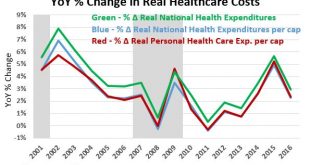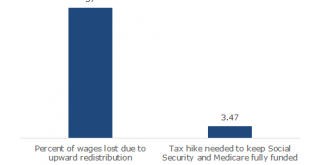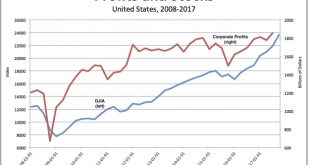Read More »
WEA Commentaries – new issue
Volume 7, Issue No. 6 Download the issue as a PDF In this issueA Philosophical Framework for Rethinking Theoretical Economics and Philosophy of EconomicsGustavo Marqués Interview on The Fascist Nature of NeoliberalismFlavia Di Mario Doomed to RepeatPeter Radford The Invisible Hand in Context Global Rentier CapitalismDavid F Ruccio Perfect Competition and CounterfactualsStuart Birks Keynes was right about Quantitative EasingMerijn Knibbe How UBER Money Dominates and Distorts Economic...
Read More »ADP, Light vehicle sales, Wolf quote
This is ADP’s forecast of tomorrow’s employment number. We’ll see tomorrow how well accurate they were: A bit higher than expected but down for 2017 vs 2016 (negative growth): Highlights Unit vehicle sales proved solid in December, at a 17.9 million annualized rate vs 17.5 million in November. Outside of October and September, which were driven by hurricane-replacement demand, December’s results are among the very best of the last two years. The results, which easily top...
Read More »Making merry on Bitcoin
from C.P. Chandrasekhar Bitcoin has left the world of finance gasping. Though the total market value of all of that cryptocurrency in circulation is only a fraction of the value of the world’s financial assets, the rapid rise in the value of the currency has made it the most wanted of those assets. On January 1, 2017, the currency was trading at between $972 to $990 a unit. By December 7 that range had risen to $14,063 to $17,363. According to a calculation by Reuters, an investment of...
Read More »Perfect competition and counterfactuals
from Stuart Birks and new issue of WEA Commentaries 7(6) From: P.17 of Birks, S. (2015). Rethinking economics: from analogies to the real world. Singapore: Springer. Market failure is defined in comparison to the ideal of perfect competition. An alternative is needed for comparison, and value judgments must be applied to justify one situation being considered superior to another. This raises two questions: (i) Is perfect competition the right ‘ideal’? (ii) If it is, then given that the...
Read More »DSGE models — unparalleled and spectacular failures
from Lars Syll The unsellability of DSGE models — private-sector firms do not pay lots of money to use DSGE models — is one strong argument against DSGE. But it is not the most damning critique of it. To me the most damning critiques that can be levelled against DSGE models are the following two: DSGE models are unable to explain involuntary unemployment In the basic DSGE models the labour market is always cleared – responding to a changing interest rate, expected lifetime incomes, or...
Read More »Changes in Healthcare Costs
I had a post the other day trying to make sense of changes in healthcare costs. Based on some of the comments to that post, a bit more thought, some data from the Centers for Medicare and Medicaid Services, and the CPI-All Urban Consumers, I think my point distills down to this graph: (click to embiggen) The graph shows the annual YoY change in real healthcare costs defined three three ways. The green line shows the annual change in total healthcare...
Read More »Diverting class warfare into generational warfare: round LVIII
from Dean Baker With the Republicans having just passed a $1.5 trillion tax cut, the bulk of which goes to the richest one percent, it was inevitable that the generational warriors would come out of the woodwork and resume the attack on Social Security and Medicare. Generational warriors try to divert attention away from how our economy has redistributed income upwards over the last four decades, and convince a large portion of today’s workers that their real problems stem from their...
Read More »It’s the profits, stupid!
from David Ruccio There’s no real mystery behind the spectacular gains in the stock market over the course of 2017. Much of it can be explained by the rise in U.S. corporate profits. But, as is clear from the chart above, the relationship between corporate profits (after tax, in red, measured on the right-hand side) and the stock market (the Dow Jones Industrial Index, in blue on the left) actually goes back almost a decade. Corporate profits have increased, from their low in the fourth...
Read More » Heterodox
Heterodox






